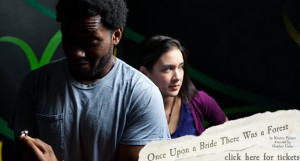 A sense of enchantment is one of the toughest things for a playwright to achieve. How does the writer create a world that rings true, at least in theatrical terms, yet in which magical events are plausible? Kristen Palmer in her new play, Once Upon a Bride There Was a Forest, currently being performed by the bold and innovative Flux Theatre Ensemble, intriguingly takes on this challenge.
A sense of enchantment is one of the toughest things for a playwright to achieve. How does the writer create a world that rings true, at least in theatrical terms, yet in which magical events are plausible? Kristen Palmer in her new play, Once Upon a Bride There Was a Forest, currently being performed by the bold and innovative Flux Theatre Ensemble, intriguingly takes on this challenge.
Josie (Rachael Hip-Flores) and Warren (Chinaza Uche) are a more or less happy young couple, at least until Warren presents Josie with one of the strangest marriage proposals on record. Josie is willing, but she’s got no one to walk her down the aisle: her father deserted her family when she was but a child. Josie begs Warren for two weeks to try to track him down, and he reluctantly agrees.
Before you can say “it was a dark and stormy night,” Josie’s car breaks down on the road outside the spooky house of the Wright family, guarded by their even spookier manservant, Mr. Livingstone (Brian Silliman). In desperate need of a phone to call a tow truck, she bluffs her way inside by pretending to be the woman the family ordered to serve as nanny to the newborn. When the family matriarch, Eugenia (Kristen Vaughan), hands Josie the constantly squalling baby, it magically stops crying, which greatly impresses Eugenia’s bubbly, marriage-minded daughter Belle (Becky Byers). However, Josie is only at a loss when she meets Eugenia’s absent-minded husband Everett (Arthur Aulisi): could this man actually be her long-lost father?
The cast deserves great credit for finding just the right tone between the comic and the creepy. Vaughn is a blast as Mrs. Wright, who does the most humorously monstrous things without ever seeming a complete monster. Aulisi as Everett is so amusingly vague that it’s easy to believe he might simply wander out of one family and into another. Byers as Belle has got the character’s retro-‘Fifties language and attitudes down cold, and delivers her dialogue with just the right brio. But the play belongs to Ms. Hip-Flores, whose dark expressive eyes convey both Josie’s passion and her anguish. This actress suggests that the most enchanting spectacle the theatre can offer is the journey of a smart young woman in search of herself.